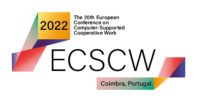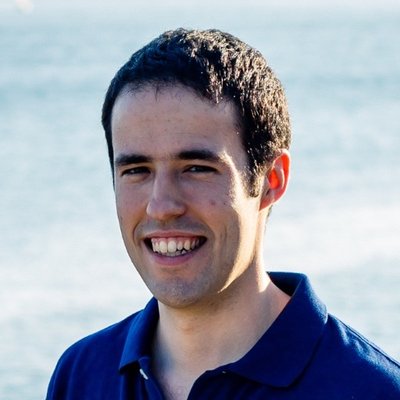Doctoral Colloquium
Important Dates
February 25th, 2022Submission due for doctoral colloquium proposals (23:59 AoE)- March 11th, 2022 Submission due for doctoral colloquium proposals (23:59 AoE)
- March 31st, 2022 Notifications to doctoral colloquium applicants
- April 29th, 2022 Deadline for the camera-ready version of the proposals
- June 27th/28th, 2022 Doctoral Colloquium in Coimbra
- June 27th – July 1st, 2022 ECSCW 2022 Conference
Submission Format & Process
- Candidates must submit:
- An application that includes:
- 1. An overview of your doctoral research of max. 2000 words, stating your research questions, methodological approach, work/findings to date, next steps, and expected contributions. Please follow the ECSCW template for your proposals. The template can be downloaded as LaTeX, RTF or MS Word format.
Submissions should include your name, affiliation and contact information. - 2. A short (2-3 paragraph) biography.
- 3. A statement detailing what you hope/expect to gain from attending the ECSCW 2022 Doctoral Colloquium and what overall questions/issues you would like to discuss at the DC.
- 1. An overview of your doctoral research of max. 2000 words, stating your research questions, methodological approach, work/findings to date, next steps, and expected contributions. Please follow the ECSCW template for your proposals. The template can be downloaded as LaTeX, RTF or MS Word format.
- A supporting letter emailed directly from the lead supervisor to the DC Chairs. This should indicate that they support your application to the ECSCW 2022 Doctoral Colloquium and that they agree that your research is at an appropriate stage for participation. It should also indicate how you and other candidates might benefit from your participation in the colloquium.
- All submission materials and the supporting letter should be sent to: dc@ecscw.eusset.eu. Please label the file with the candidate surname first.
- An application that includes:
Doctoral Colloquium Chairs
For any queries, please, do not hesitate to contact the ECSCW 2022 Doctoral Colloquium Chairs at dc@ecscw.eusset.eu.
Aarhus University, Denmark
Fraunhofer AICOS, Portugal
Doctoral Colloquium Description
The ECSCW 2022 Doctoral Colloquium provides an opportunity for doctoral students to discuss their research in an international forum under the guidance of a panel of experienced CSCW researchers.
We invite candidates who are working broadly in the field of CSCW to apply. Candidates at any stage of the PhD process will be considered. However, the strongest candidates will be those who have a well-developed research proposal and have made some progress towards realising it (e.g. empirical findings, or a proposed conceptual framework, etc.), while still having time to benefit from advice and feedback by peers and senior colleagues. Selected candidates will be asked to give short, informal presentations during the Colloquium. These will be followed by group discussions in a friendly and constructive workshop. Each candidate can expect to have 30 minutes for presentation, questions and discussion.
Candidates accepted for the ECSCW 2022 Doctoral Colloquium will also have the opportunity to attend, free of charge, a one-day program of Masterclasses (dates and availability to be confirmed).
Accepted participants will have the opportunity to have their research overview published in the EUSSET Digital Library (https://www.eusset.eu/digital-library/).
Publication & Copyright Information
Accepted submissions will be published in the ECSCW/EUSSET Digital Library: http://www.eusset.eu/digital-library/
The EUSSET digital library (DL) is an open access repository. The EUSSET DL does not ask for transfer of copyright from authors. The EUSSET DL does, however, require sufficient rights that allow “readers to read, download, copy, distribute, print, search and link to the full texts of articles, or use them for any other lawful purpose except where otherwise noted” (full info here: https://www.eusset.eu/digital-library/).
The authors will have several options when it comes to copyright upon paper acceptance:
In order to submit an article to EUSSET DL, the submitter must either:
- • grant EUSSET DL a non-exclusive and irrevocable license to distribute the article, and certify that he/she has the right to grant this license;
- • certify that the work is available under one of the following Creative Commons licenses and that he/she has the right to assign this license:
- Creative Commons Attribution license (CC BY 4.0)
- Creative Commons Attribution-ShareAlike license (CC BY-SA 4.0)
- Creative Commons Attribution -Noncommercial-ShareAlike license (CC BY-NC-SA 4.0);
- or dedicate the work to the public domain by associating the Creative Commons Public Domain Dedication (CC0 1.0) with the submission.
- • In the most common case, authors have the right to grant these licenses because they hold copyright in their own work.


